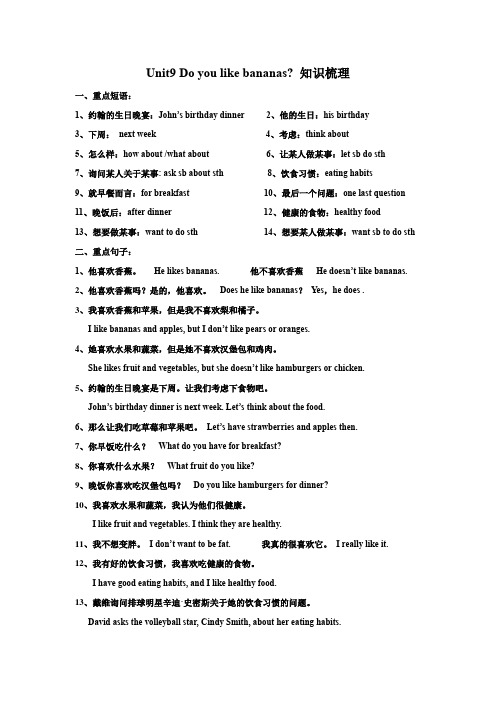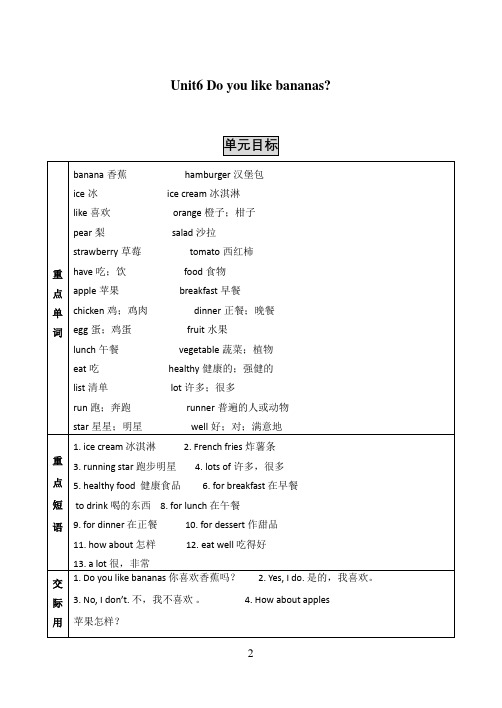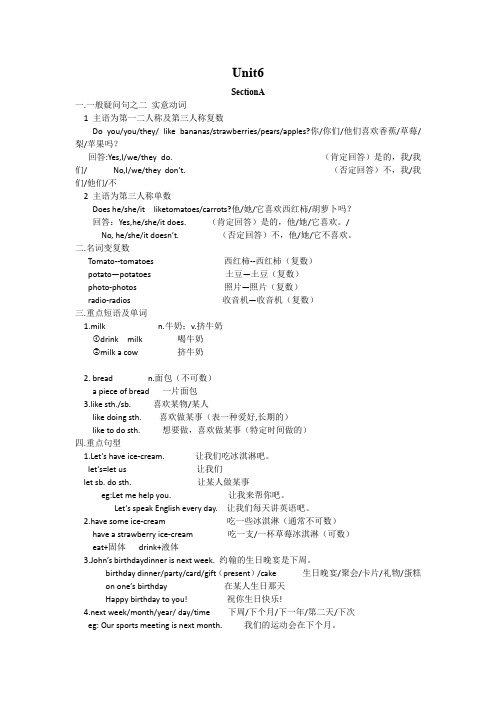六年级总复习 unit1Do you like bananas
- 格式:doc
- 大小:61.00 KB
- 文档页数:7

六年级上册Unit 9 Do you like bananas? 知识清单一、单词:表示食物的单词可数名词:banana, hamburger, tomato(es), strawberry, pear, apple, egg, carrot, vegetable不可数名词:milk, bread, rice既可数又不可数:food, fruit, icecream, salad, chicken三餐:breakfast,lunch, dinnerhealthhealthyhealthily (healthy food, eat healthily, keep healthy)二、重要短语和知识点Section A1.Do you like bananas? bananas用复数形式,表示这一类食物。
2.Let's have...让我们吃……吧。
(let sb. do sth.)3.birthday dinner生日晚餐4.next week下周5.think about the food考虑食物6.What/How about...(+doing sth.)……怎么样。
7.some fruit一些水果8.have strawberries and apples吃草莓和苹果9.You are right.你是对的。
Section B1.sports star体育明星2.eat well吃得好4.eating habits饮食习惯5.one last question最后一个问题6.after dinner晚饭后7.want to do sth.想要做某事8.be fat变胖9.healthy food健康食物10.volleyball star排球明星11.for breakfast作为早餐三、句子Section A1.你喜欢吃色拉吗? 不,不喜欢. Do you like salad? No, I don’t.2.他们喜欢吃橘子吗? 是的,喜欢吃. Do they like oranges? Yes, they do.3.他喜欢吃香蕉吗? 不, 不喜欢. Does he like bananas? No, he doesn’t.4.她喜欢吃西红柿吗? 是的, 喜欢吃. Does she like tomatoes? Yes, she does.5.我喜欢吃色拉. 我不喜欢吃花椰菜I like salad. I don’t like broccoli.6.他们喜欢吃橘子,但不喜欢吃香蕉. They like oranges, but they don’t like bananas.7.她喜欢吃汉堡但不喜欢吃薯条. She likes hamburgers, but she doesn’t like French fries.8.咱们吃冰激凌吧! Let’s have ice cream.Section B9.早饭, 他喜欢吃鸡蛋,胡萝卜和苹果. For breakfast, he likes eggs, carrots and apples.10. 运动明星吃的好。

Unit9Do you like bananas?知识梳理一、重点短语:1、约翰的生日晚宴:John’s birthday dinner2、他的生日:his birthday3、下周:next week4、考虑:think about5、怎么样:how about /what about6、让某人做某事:let sb do sth7、询问某人关于某事: ask sb about sth 8、饮食习惯:eating habits9、就早餐而言:for breakfast 10、最后一个问题:one last question 11、晚饭后:after dinner 12、健康的食物:healthy food13、想要做某事:want to do sth 14、想要某人做某事:want sb to do sth二、重点句子:1、他喜欢香蕉。
He likes bananas.他不喜欢香蕉He doesn’t like bananas.2、他喜欢香蕉吗?是的,他喜欢。
Does he like bananas?Yes,he does .3、我喜欢香蕉和苹果,但是我不喜欢梨和橘子。
I like bananas and apples, but I don’t like pears or oranges.4、她喜欢水果和蔬菜,但是她不喜欢汉堡包和鸡肉。
She likes fruit and vegetables, but she doesn’t like hamburgers or chicken.5、约翰的生日晚宴是下周。
让我们考虑下食物吧。
John’s birthday dinner is next week. Let’s think about the food.6、那么让我们吃草莓和苹果吧。
Let’s have strawberries and apples then.7、你早饭吃什么?What do you have for breakfast?8、你喜欢什么水果?What fruit do you like?9、晚饭你喜欢吃汉堡包吗?Do you like hamburgers for dinner?10、我喜欢水果和蔬菜,我认为他们很健康。

人教版-英语--上-6单元-D o-y o u-l i k e-b a n a n a s-单元复习本页仅作为文档页封面,使用时可以删除This document is for reference only-rar21year.MarchUnit6 Do you like bananas?2Section A1. like v. 喜欢后面加名词,也可以加动词的—ing 形式,有固定短语:like to do sth =like doing sth (喜欢做什么)其中,like to do 是表示:习惯做什么; like doing 是表示:爱好干什么。
例如:I like watching TV. 我喜欢看电视She likes to get up at six o’clock .她习惯在六点起床2. tomato n.西红柿3其复数在后面加es,与tomato一样以o结尾的词,起复数有两种形式。
有生命的词加es。
如:tomato—tomatoes西红柿 potato—potatoes马铃薯,无生命的词加s如:radio—radios收音机 photo—photos图片。
3. orange. 橘子,橙子橘子汁;做“橘子,橙子”讲时,为可数名词,复数加s,例如:He has two oranges.做橘子汁讲,为不可数名词,例如:I want to drink some orange.4. salad n. 沙拉salad是不可数名词,故没有复数形式,也不能用不定冠词a或an 修饰。
如:Pass me the salad, please. 请递给我那份沙拉。
5. food n. 食品,食物(1)通常用作不可数名词,但指特定食品时为可数名词,如:She want to eat some food.她想吃点东西I like Chinese food very much.我很喜欢中式食品(2)常用作短语,food and drink饮食6. 辨析:talk about talk with talk to(1) talk about sth. 意思是:谈论某事。


Unit 6 Do you like bananas?Lesson planI.Teachin.aims1.Knowledg.aims.通过本节课学习, 同学们能够熟练地、正确地使用以下单词: k.bread2.Abilit.aims.熟练运用以下句型:.like.…..don’.like.….-D.yo.like.…. -Yes..do..No..don’t..-She/H.likes...She/H.doesn’.like.….-Doe.she/h.like.…..-Yes.she/h.does. No.she/h.doesn’t.3.Emotio.aims.讨论美食, 了解同学间的喜好, 养成健康的饮食习惯。
II.Teachin.difficulties1.学会使用交际用语:“Do you like……?”以及第三人称单数形式;2.可数名词和不可数名词的分类。
III.Teachin.procedure1.Step1.Warmin.up2.Greetings.3.Show the learning aims.4.Memory challenge.(Review the new words and the plurals of them)5.Recognize the countable nouns and uncountable nouns.Step2.Leading-in1.T..lik.strawberries..don’k.Ho.abou.you?S1..lik.bananas..don’.lik.pears.S2..like...don’.like.…2.S..lik.hamburgers..don’.lik.tomatoes..ask.th.othe.Ss.He/Sh.likes.…He/Sh.doesn’.like.…3.Le.S.practic.i.pairs.A..like..….don’.like..B.He/Sh.likes.…He/Sh.doesn’.like.…4.Ac.out.1.Step3.PracticeT.Jus.now.you’v.go.it..lik.strawberries.D.yo.lik.strawberries?S.Yes..do..No..don’t.(As.S.on.b.one.)2.Practic.th.conversation.i.pair.an.the.ac.out.3.T.D.yo.like.….S.Yes..do..No..don’t..ask.th.others.Doe.he/sh.like.…. Ss.Yes.he/sh.does. No.he/sh.doesn’t..th.tw.picture.t.practic.th.conversation.an.the.ac.out.5.Tel.Ss.I.yo.wan.t.kee.fi.lik.tha.bo.i.th.picture.yo.shoul.ea.mor.fruit.an.vegetables.Yo. shouldn’.ea.muc.jun.foo.lik.hamburgers.Step4.Listening1.1b.Numbe.th.conversations.(Catc.th.ke.words)2.Chec.th.answer.an.rea.together.3.2a.Circl.th.foo.yo.hear.4.2b.Liste.agai.an.fil.i.th.blanks.5.Chec.th.answer.an.rea.together.Step5.Writing1.Accordin.t.th.char.abou.tw.students.like.an.dislikes.writ..passage.(A.leas..sentences.)2.Le.som.student.t.rea.an.correc.them.Step6.SummaryI.thi.class.we’.o.foods.fruit.an.vegetable.an.practice.askin.an.answerin.question.abou .like.an.dislikes.An.remembe.th.rule.o.nou.plurals.Step7.Homework1.复习记忆本课所学的单词。

Unit6SectionA一.一般疑问句之二实意动词1 主语为第一二人称及第三人称复数Do you/you/they/ like bananas/strawberries/pears/apples?你/你们/他们喜欢香蕉/草莓/ 梨/苹果吗?回答:Yes,I/we/they do. (肯定回答)是的,我/我们/ No,I/we/they don’t. (否定回答)不,我/我们/他们/不2 主语为第三人称单数Does he/she/it liketomatoes/carrots?他/她/它喜欢西红柿/胡萝卜吗?回答:Yes,he/she/it does. (肯定回答)是的,他/她/它喜欢。
/No, he/she/it doesn’t. (否定回答)不,他/她/它不喜欢。
二.名词变复数Tomato--tomatoes 西红柿--西红柿(复数)potato—potatoes 土豆—土豆(复数)photo-photos 照片—照片(复数)radio-radios 收音机—收音机(复数)三.重点短语及单词k n.牛奶;v.挤牛奶①drink milk 喝牛奶②milk a cow 挤牛奶2. bread n.面包(不可数)a piece of bread 一片面包3.like sth./sb. 喜欢某物/某人like doing sth. 喜欢做某事(表一种爱好,长期的)like to do sth. 想要做,喜欢做某事(特定时间做的)四.重点句型1.Let’s have ice-cream. 让我们吃冰淇淋吧。
let’s=let us 让我们let sb. do sth. 让某人做某事eg:Let me help you. 让我来帮你吧。
Let’s speak English every day. 让我们每天讲英语吧。
2.have some ice-cream 吃一些冰淇淋(通常不可数)have a strawberry ice-cream 吃一支/一杯草莓冰淇淋(可数)eat+固体drink+液体3.John’s birthdaydinner is next week. 约翰的生日晚宴是下周。
七年级上Unit 6Do you like bananas 知识点总结谈论对事物的喜好a.一般情况下,加-s; eg:like---likesb.以ch,sh等结尾的动-es,eg:watch--watchesc.以辅音字母+y结尾的动词,直接加规则动词 d. 以元音字母+y结尾的动词,变y为i加e.以字母o结尾,一般加-s动词第三人称单数形式变化规律不规则动词:have----hasfor + breabfast / lunch / dinnerfor breakfast? 你早餐喜欢吃什么?I like chicken for breakfast. 我早餐喜欢吃鸡肉。
举一反三:1.What do you like like for + breabfast / lunch / dinner?你早餐/午餐/ 晚餐喜欢吃什么?I like sth for breakfast/ lunch / dinner.我早餐喜欢吃鸡肉。
2.What do they like like for + breabfast / lunch / dinner?他们早餐/午餐/ 晚餐喜欢吃什么?They like sth for breakfast/ lunch / dinner.他们早餐喜欢吃鸡肉。
3.What does he/she like like for + breabfast / lunch / dinner?他/她早餐/午餐/ 晚餐喜欢吃什么?He/She likes sth for breakfast/ lunch / dinner.他/她早餐喜欢吃鸡肉1)可数名词、不可数名词、即可数又不可数名词2)可数名词单数变复数的规则1.一般情况下直接加-s, girls, books,2. 以s, x, ch, sh 结尾的加-es , classes, boxes, brushes,3.以辅音字母加y 结尾, 4, 以元音字母加y 结尾, 或fe 结尾, Phrases 1. birth 出生 day 日;天 birthday 生日 birthday dinner 生日聚餐 2. right 正确的;适当的 你是对的。
Unit6 Do you like bananas?Section A后面加名词,也可以加动词的—ing 形式,有固定短语:like to do sth =like doing sth (喜欢做什么)其中,like to do 是表示:习惯做什么; like doing 是表示:爱好干什么。
例如:I like watching TV. 我喜欢看电视She likes to get up at six o’clock .她习惯在六点起床2. tomato n.西红柿其复数在后面加es,与tomato一样以o结尾的词,起复数有两种形式。
有生命的词加es。
如:tomato—tomatoes西红柿potato—potatoes马铃薯,无生命的词加s如:radio—radios收音机photo—photos图片。
3. orange. 橘子,橙子橘子汁;做“橘子,橙子”讲时,为可数名词,复数加s,例如:He has two oranges.做橘子汁讲,为不可数名词,例如:I want to drink some orange.4. salad n. 沙拉salad是不可数名词,故没有复数形式,也不能用不定冠词a或an 修饰。
如:Pass me thesalad, please. 请递给我那份沙拉。
5. food n. 食品,食物(1)通常用作不可数名词,但指特定食品时为可数名词,如:She want to eat some food.她想吃点东西I like Chinese food very much.我很喜欢中式食品(2)常用作短语,food and drink饮食6. 辨析:talk about talk with talk to(1) talk about sth. 意思是:谈论某事。
如:They are talking about the traffic accident. 他们正在谈论那个交通事故。
六年级总复习Do you like bananas ?第一课时青联学校彭霞教学目标(一)语言技能目标1. 能够询问对方或他人的饮食爱好。
2. 学会用两种不同方式回答和表达个人喜恶.( 二) 语言知识目标1.掌握并正确运用常见的食物名称。
2.了解并掌握可数名词以及不可数名词的用法。
3.掌握并运用目标句型:--Do you like bananas? --Yes, I do.No,Idon’t.--Does he like salad? --Yes,he does.No, he doesn’t.(三) 情感态度目标1.通过对食物喜好的提问,能增强同学之间的相互了解和培养合作精神。
2.学生对周围的事物要用心地观察,做个生活的有心人。
教学重难点(一)教学重点:1.掌握重点词汇:记住常吃的食物名称,包括水果和蔬菜等。
2.重点句型 like 的一般现在时的用法(肯定句、疑问句及否定回答)能用“Do you like…? ”“Yes, I do. I like…. / No, I don’t. I don’t li ke…”“Does he like…”“Yes, he does. He likes……/ No, he doesn’t. H e doesn’t like……”目标句型询问他人对某事物的喜欢与不喜欢的情感态度。
(二)教学难点:1.可数名词与不可数名词的运用。
2.运用本课时重点词汇和句型表达喜欢和不喜欢的这类情感。
教学准备:单词卡片,录音机,录音带,袋子,部分食物教学过程:Step1 : warm-up1、GreetingsT: Good morning ,boys and girlsSs: Good morning,teacherT: How are you?Ss: Fine,thanks……2、Let’s sing an apple song together ,OK?设计意图:开课时播放一曲学生喜闻乐见的“Apple Song”师生一起吟唱,营造快东,轻松的英语氛围,吸引学生的注意力。
Step2: Review出示实物水果,引导学生试着以抢答的形式说出更多的水果单词。
依次教学蔬菜、食物、饮料的单词Step3:Sentence games (Memory game)T:Let’s play games. Listen to others carefully,then I’ll ask you some questions.Game1. (Rule: Please don’t repeat others. )A1: I like apples.B1: I like bananas.C1: I like………….Ask the others : What does A1 like?S1: She likes apples.S2: She likes….……Game2A2: I don't like apples.B2: I don’t like bananas.C2: Idon’t like………….(Rule: Please don’t repeat others. )Ask the others : What doesn’t A2 like?S11: She doesn’t like apples.S21: She doesn’t like….Game3Ask the students the likes and dislikes of different students.Point at A1 and askT: Does she /he like …?Ss: Yes, she/he does. She/He likes….No, she/he doesn’t. She/He doesn’t like…(板书)设计意图:学生喜欢游戏,以此提高他们的学习兴趣。
学生在游戏中不仅要求学生能表达自己对食物的喜好,还要学会认真倾听别人,养成良好的习惯,这样才能更好地参与游戏中来。
在游戏中很自然地导出本课的学习重点和难点,并且game1和game2 对于game3 是一个铺垫,游戏具有梯度,为最后的游戏服务,从而分解了难点,突破了难点。
Step4:Pair work学生分角色上台表演Step5:PresentationT:There are many food. I’d like some rice、cabbage、tofu and fish. What would you like for lunch ?S: I’d like……T: What’s your favourite food? Why?S: My favoruite food is …Because …..Step6:Practice(1)Practice the DialogueListen to the tape for two timesCheck the answers(2)Writing a short passageStep7:ConclusionStep8:Homework(1)Ask your parents to find out what they like and dislike.(2)Finish the short passage .Step9:Sing a song第二课时一、教学目标:1.知识目标1)、将所学内容编成一个对话。
2)、巩固语言知识点,即可教名词与不可数名词。
3.能力目标:学会综合运用英语交谈喜欢与不喜欢的事物以及一日三餐的食谱。
4.情感目标:懂得饮食合理、健康。
二、教学重点:复习单词、句型以及一日三餐表达方法。
三、教学难点:可数名词、不可数名词的分类。
四、教学设计:Setp1 : warm-up1、GreetingsT: Good morning ,boys and girlsSs: Good morning,teacherT: How are you?Ss: Fine,thanks……2、Let’s sing a song together ,OK?Setp2 : Review复习内容:要求学生编一个关于讨论喜欢的食物以及一日三餐食谱的对话。
本环节课堂实录如下:T: Look at the screen.Who are they?Ss: 蜡笔小新和樱桃小丸子.T: Yes, they meet each other on Sunday. What do they talk about?Ss: Hamburgers,French fries……(Show the conversation.)T: OK.Let’s read it together.Boys: Good afternoon.Girls: Good afternoon.Boys: Let’s go to the KFC together.Girls: great!I’d like to go.Boys: What do you have for lunch?Girls: I have hamburgers and salad.What about you?Boys: I have rice, fish and broccoli.Girls: What do you like for dinner in KFC?Boys: I like hamburgers,chicken and rce cream.And you?Girls: Me, too.Boys: OK.Let’s go!T: Now please make a conversation like this with your partners.Two minutes.(Two minutes later.)T: Now, I’d like to ask some pairs to act it out. You please.A: Nice to meet you.B: Nice to meet you.A: Oh,it’s seven o’clock now. Let’s go to school.B: OK.A: Do you like apples?B: Yes, I do.A: Do you like strawberries?B: No,I don’t. It’s too sour. Do you like French fries ?A: No,I don’t.It’s isn’t healthy food.B: What do you have for breakfast?A: For breakfast,I have hamburgers, eggs and orange juice. What about you ?B: I have hamburgers, French fries and coca cola.A: Let’s have lunch together, OK ?B: OK.Bye-bye.A: Bye.(A is a girl,B is a boy.)Step3 :归纳语言点可数与不可数名词。
(注:由于学生对于语法讲解不太熟悉,为便于学生们理解及掌握,本环节以中文讲解为主。
)本环节课堂实录:T: Next let’s review the grammar together.Please take out your notebooks.T: 英语名词可以大致分为两类,是哪两类?Ss: 可数名词和不可数名词。
T: 对,可数名词又可以分为两类:单数和复数名词。
1.可数名词。
举例:apple,orange,desk,chair,book等。
2.不可数名词。
比如:water, milk, bread, news等。
不可数名词一般没有复数形式。
表示其数量时要用计量名词。
比如a glass of water,一杯水,a piece of news一则新闻。
3.有时既可当可数名词又可当不可数名词。
如:ice cream, salad,chicken.T: 好的,接下来我们来看可数名词的复数形式。
可数名词由单数变为复数有五种情况:1.词尾加s,如apples,oranges.2.以s, x ,ch ,sh ,o结尾的加es,如bus--buses, box--boxes, watch--watches, brush--brushes, tomato--tomatoes. 但有些例外。
如:radios, photos, zoos.3.以y结尾的,去y加ies. 如story--stories.4.以f或fe结尾的,去f或fe加ves. 如knife--knives.5.不规则变化:如child--children, man--men, tooth--teeth.T: 关于名词的复数形式,清楚了吗?Ss: 清楚。